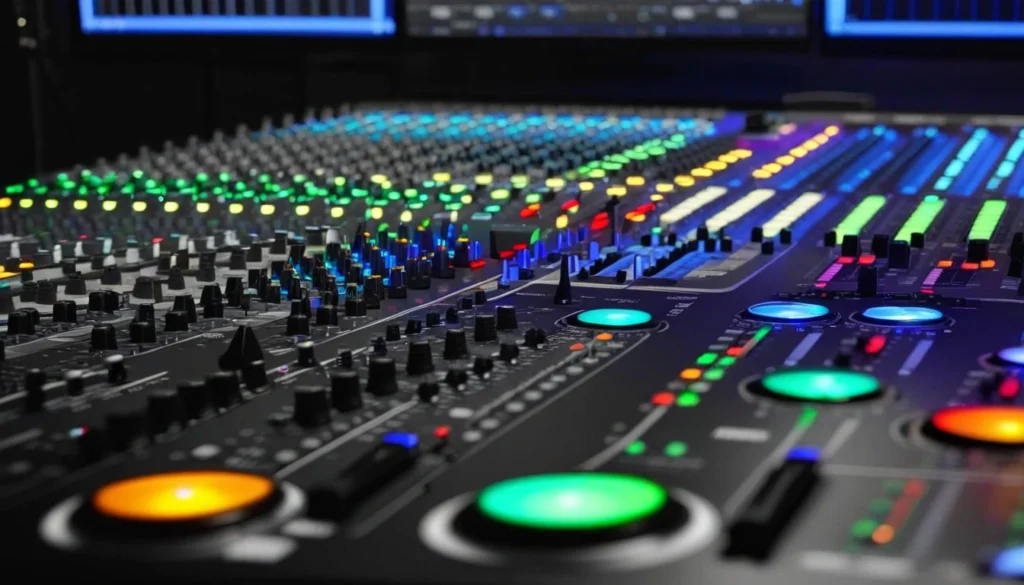
Music Mixing What does mixing mean in music?
Table of Contents
What is Music Mixing?
Discover the meaning of mixing and how it affects music creation. Recognize the fundamentals of mixing, the value of a song that is well-mixed, and the function of an audio engineer. Learn how mixing improves the listening experience as a whole and recognize the expertise and creativity involved in the process.
What Does Mixing Mean in Music?

Music Mixing Basics
There are several steps in the production process when it comes to making music. Mixing is one of the most important procedures. However, what does mixing actually imply in music? This essay will examine mixing as an idea and its importance in the music industry.
Understanding the Basics
In the context of music production, mixing is the act of putting together several audio tracks and components to produce a final mix that is harmonious and well-balanced. It entails modifying the levels, panning, and equalization of every track to make sure they mesh well together and provide the listener with a satisfying auditory experience.
A competent audio engineer uses a digital audio workstation (DAW) to adjust and improve a song’s different components during the mixing stage. This include tweaking the overall tonal balance, adding effects like reverb or delay, and altering the volume levels of each instrument and vocal recording individually.
The Importance of Music Mixing
A song’s overall tone is greatly influenced by the mixing process. This is the point at when each component of a song comes together to create a coherent whole. A song that is professionally mixed sounds clear, balanced, and polished.
Making sure that every instrument and vocal recording has a distinct sound area in the mix is one of the primary objectives of mixing. To avoid conflicts or muddying between various elements, this calls for cautious EQing and panning. Each instrument may be heard clearly in a song that has been mixed well, giving it depth and character.
To further improve a song’s aural qualities, mixing also entails the use of artistic effects. To do this, incorporate delays, reverbs, and other spatial effects to produce a feeling of room and atmosphere. These effects can give the mix greater width, depth, and texture, which will captivate and envelop the listener.
The Role of the Audio Engineer
Technical proficiency and an acute sense of detail are prerequisites for the art of mixing. An expert audio engineer is aware of the nuances of various audio processing tools and methods and knows how to apply them skillfully to produce the intended audio outcome.
The audio engineer makes crucial choices regarding the mix’s overall dynamics, tonal balance, and where each component should go in the stereo field throughout the mixing process. To make sure that the finished mix reflects the artist’s or producer’s creative vision and has the desired emotional impact, they collaborate closely with them.
It’s important to remember that mixing is a subjective process, and several engineers may take different approaches to it. But the ultimate objective is always to produce a mix that accurately captures the artist’s purpose and sounds fantastic on a variety of playback systems.
Getting the best audio quality
In order to reach the highest level of audio perfection, one needs to set out to obtain flawless sound quality. Investing in high-fidelity audio gear is the first step in capturing every note and nuance with unmatched accuracy.
Choosing a premium audio source—lossless files or high-definition streaming—becomes your compass for reaching aural bliss. Enter a room designed with optimal acoustics, where the soundscape can freely develop into a harmonious whole.
Use a keen ear to adjust your settings, adjusting frequencies to create a pleasing soundscape. Recall that finding the highest audio quality is a symphony of commitment, judgment, and unwavering pursuit of aural perfection rather than merely a voyage.
Types of audio format
Oh, the varied orchestra of audio formats! The first is the well-known and cross-platform MP3, a compressed format that gives up some quality in exchange for ease of use. For those who desire complete quality, FLAC is a lossless format that keeps all of the audio information.
Audiophiles love the raw, unadulterated sound of WAV, an uncompressed format. Apple users frequently dance to AAC music, which has higher quality than MP3 at comparable file sizes. For the purists, the DSD (Direct Stream Digital) codec captures sounds in a unique way.
Remember the flexible open-source format OGG as well as the always developing realm of spatial audio formats such as DTS:X and Dolby Atmos, which give the audio experience a three-dimensional twist. Each format contributes a distinct note to the auditory symphony, enabling fans to choose their sound pallet.
Conclusion music mixing
A crucial stage in the creation of music is mixing. To produce a polished and seamless final mix, it entails mixing several audio recordings, modifying their levels and tonal balance, and adding artistic effects. A well-mixed music improves the audience’s whole listening experience in addition to sounding fantastic. Thus, the next time you listen to your favorite song, stop and consider the expertise and artistry involved in the mixing process.
Check out this blog related to this blog
Check our featured blog
Understanding Audio Signal Flow
Can AI Replace Human Musicians? Exploring the Future of Music Creation
Can AI replace human artists? Artificial intelligence in music Can AI Replace Human Musicians? Introduction Artificial intelligence in music (AI) is swiftly changing multiple industries, and the music sector is no different. The incorporation of AI into music production, songwriting, and live performance has opened the door to inventive practices and technologies that question conventional…
How to Use Vocal Compressor?
How to Use Vocal Compressor? Vocal compression is an important step in music production for creating a refined sound. This article covers everything from how to set up your compressor and dial in the optimum settings to advanced techniques like as parallel and side-chain compression. Learn how to control dynamic range, establish voice presence, and…
Difference Between Home Studio and Professional Studio
Difference Between Home Studio and Professional Studio Discover the fundamental distinctions between home and professional audio production facilities. Learn about each type of studio’s equipment, technology, and expenses, as well as the benefits and drawbacks. Whether you’re a hobbyist or a professional, this guide will help you select the best configuration for your requirements. Introduction…

Leave a Reply